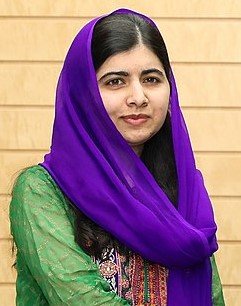Malala Yousafzai is a 2014 Nobel Peace Prize laureate, a Pakistani female education activist and a globally renowned keynote speaker.
As the world’s youngest Nobel Prize laureate at just 17 years old, Malala’s advocacy for human rights, especially for women’s and children’s education, has grown into an international movement.
She was born on 12 July 1997, to a Yusufzai Pashtun family in Swat, Pakistan, and named after the Afghan folk heroine Malalai of Maiwand. In early 2009, at the age of 11, Malala wrote a blog under her pseudonym Gul Makai, detailing her life during the Taliban’s occupation of Swat, which gained international attention. Her prominence increased further when journalist Adam B. Ellick made a New York Times documentary about her life.
In 2012, Malala survived an assassination attempt by a Taliban gunman while on a bus in Swat, which sparked international outpouring of support. After her recovery, Malala co-founded the Malala Fund, a non-profit organization based in Birmingham, to promote the right to education.
Malala’s advocacy for education, women’s rights, and peace has won her many accolades, including the 2013 Sakharov Prize, Pakistan’s first National Youth Peace Prize, and honorary Canadian citizenship.
In 2014, she became the co-recipient of the Nobel Peace Prize, making her the youngest-ever laureate. In addition to her activism, Malala is also an accomplished author, having co-authored the international best-seller “I Am Malala.”
Malala completed her secondary education in England, and in 2020, she graduated with a Bachelor of Arts degree in Philosophy, Politics, and Economics from Lady Margaret Hall, Oxford.
With her inspirational story and powerful message, Malala is a sought-after keynote speaker at events around the world, sharing her insights and experiences to motivate audiences to create a better future for all.




